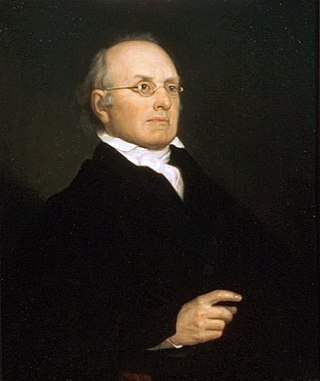
The Act Prohibiting Importation of Slaves of 1807 is a United States federal law that prohibited the importation of slaves into the United States. It took effect on January 1, 1808, the earliest date permitted by the United States Constitution.

The 16th United States Congress was a meeting of the legislative branch of the United States federal government, consisting of the United States Senate and the United States House of Representatives. It met in Washington, D.C. from March 4, 1819, to March 4, 1821, during the third and fourth years of James Monroe's presidency. The apportionment of seats in the House of Representatives was based on the 1810 United States census. Both chambers had a Democratic-Republican majority.

The 101st United States Congress was a meeting of the legislative branch of the United States federal government, composed of the United States Senate and the United States House of Representatives. It met in Washington, D.C., from January 3, 1989, to January 3, 1991, during the final weeks of Ronald Reagan's presidency and the first two years of George H. W. Bush's presidency.

The Blockade of Africa began in 1808 after the United Kingdom outlawed the Atlantic slave trade, making it illegal for British ships to transport slaves. The Royal Navy immediately established a presence off Africa to enforce the ban, called the West Africa Squadron. Although the ban initially applied only to British ships, Britain negotiated treaties with other countries to give the Royal Navy the right to intercept and search their ships for slaves.

The 90th United States Congress was a meeting of the legislative branch of the United States federal government, composed of the United States Senate and the United States House of Representatives. It met in Washington, D.C., from January 3, 1967, to January 3, 1969, during the last two years of President Lyndon B. Johnson's second term in office.

The Confiscation Act of 1862, or Second Confiscation Act, was a law passed by the United States Congress during the American Civil War. Section 9 of the act formed the legal basis for President Abraham Lincoln's Emancipation Proclamation.

The Morrill Anti-Bigamy Act was a federal enactment of the United States Congress that was signed into law on July 1, 1862, by President Abraham Lincoln. Sponsored by Justin Smith Morrill of Vermont, the act banned bigamy in federal territories such as Utah and limited church and non-profit ownership in any territory of the United States to $50,000.

Slave Trade Act is a stock short title used for legislation in the United Kingdom and the United States that relates to the slave trade.

Texas Gulf Coast is an intertidal zone which borders the coastal region of South Texas, Southeast Texas, and the Texas Coastal Bend. The Texas coastal geography boundaries the Gulf of Mexico encompassing a geographical distance relative bearing at 367 miles (591 km) of coastline according to CRS and 3,359 miles (5,406 km) of shoreline according to NOAA.
Aiding and abetting is a legal doctrine related to the guilt of someone who aids or abets another person in the commission of a crime. It exists in a number of different countries and generally allows a court to pronounce someone guilty for aiding and abetting in a crime even if he or she is not the principal offender. The words aiding, abetting and accessory are closely used but have differences. While aiding means providing support or assistance to someone, abetting means encouraging someone else to commit a crime. Accessory is someone who in fact assists "commission of a crime committed primarily by someone else". However, some jurisdictions have merged being an accessory before the fact with aiding and abetting.
Antelope was a slave ship that the United States captured in 1820 with more than 280 captive Africans aboard. It had been legally engaged in the African slave trade under the flag of Spain when it was taken over by a privateer at Cabinda. The legal case on the fate of the captured Africans, known as The Antelope, lasted for seven years, with some of the Africans being turned over as slaves to Spanish owners, while 120 were sent as free people to Liberia. Both the commandeering of the boat, as well as the ensuing trial, are the subject of the book Dark Places of the Earth, by Jonathan M. Bryant.

The Anti-Drug Abuse Act of 1988 is a major law of the War on Drugs passed by the U.S. Congress which did several significant things:
- Created the policy goal of a drug-free America;
- Established the Office of National Drug Control Policy; and
- Restored the use of the death penalty by the federal government.
The Antelope, 23 U.S. 66 (1825), was a case in which the Supreme Court of the United States considered, for the first time, the legitimacy of the international slave trade, and determined "that possession on board of a vessel was evidence of property".

The Marshall Court (1801–1835) heard forty-one criminal law cases, slightly more than one per year. Among such cases are United States v. Simms (1803), United States v. More (1805), Ex parte Bollman (1807), United States v. Hudson (1812), Cohens v. Virginia (1821), United States v. Perez (1824), Worcester v. Georgia (1832), and United States v. Wilson (1833).

The Taney Court heard thirty criminal law cases, approximately one per year. Notable cases include Prigg v. Pennsylvania (1842), United States v. Rogers (1846), Ableman v. Booth (1858), Ex parte Vallandigham (1861), and United States v. Jackalow (1862).

The Crimes Act of 1790, formally titled An Act for the Punishment of Certain Crimes Against the United States, defined some of the first federal crimes in the United States and expanded on the criminal procedure provisions of the Judiciary Act of 1789. The Crimes Act was a "comprehensive statute defining an impressive variety of federal crimes".

The Crimes Act of 1825, formally titled An Act more effectually to provide for the punishment of certain crimes against the United States, and for other purposes, was the first piece of omnibus federal criminal legislation since the Crimes Act of 1790. In general, the 1825 act provided more punishment than the 1790 act. The maximum authorized sentence of imprisonment was increased from 7 to 10 years; the maximum fine from $5,000 to $10,000. But, the punishments of stripes and pillory were not provided for.

Federal Explosives Act of 1917 is a United States federal statutory law citing an incriminating act for the distribution, manufacture, possession, storage, and use of explosive material during the time of war. The Act of Congress authorizes the federal regulation of the distribution, manufacture, possession, storage, and use of incendiary material during wartime.

The importation of slaves from overseas to the United States was prohibited in 1808, but criminal trafficking of enslaved people on a smaller scale likely continued for many years. The most intensive periods of piracy were in the 1810s, before the U.S. Congress passed laws with massive fines and penalties including execution for illegal importers, and in the 1850s, when pro-slavery activists decided that the solution to rapid inflation in slave prices was simply to flood the market with humans abducted from across the ocean.












